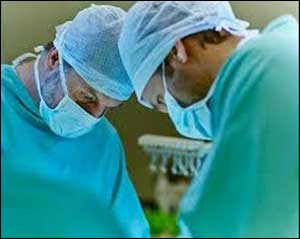- Home
- Editorial
- News
- Practice Guidelines
- Anesthesiology Guidelines
- Cancer Guidelines
- Cardiac Sciences Guidelines
- Critical Care Guidelines
- Dentistry Guidelines
- Dermatology Guidelines
- Diabetes and Endo Guidelines
- Diagnostics Guidelines
- ENT Guidelines
- Featured Practice Guidelines
- Gastroenterology Guidelines
- Geriatrics Guidelines
- Medicine Guidelines
- Nephrology Guidelines
- Neurosciences Guidelines
- Obs and Gynae Guidelines
- Ophthalmology Guidelines
- Orthopaedics Guidelines
- Paediatrics Guidelines
- Psychiatry Guidelines
- Pulmonology Guidelines
- Radiology Guidelines
- Surgery Guidelines
- Urology Guidelines
Novel scoring system helps predict stroke risk after surgery

STRAS (stroke after surgery score) -- a novel scoring system developed by a team of researchers may help in predicting ischemic stroke after surgery. The new score accurately predicted the risk in patients with and without a history of ischemic stroke. This development is significant as the adverse effect (stroke) may sometimes prove deadly.
Postoperative ischemic stroke ranks among the most feared complications in surgery and is associated with considerable implications for individual outcomes. Risk factors for ischemic stroke include pre-operatively diagnosed patent foramen ovale (PFO) or a history of migraine. Katharina Platzbecker, a research fellow at Massachusetts General Hospital, in Boston, and colleagues aimed to provide a tool that helps identify patients that would benefit from prevention in terms of mitigating ischemic stroke risk.
“Ischemic stroke after surgery affects a large patient population,” said Platzbecker. “Earlier this year, our group reported that ischemic stroke risk after surgery is not only high in the immediate postoperative period but remains elevated for up to two years after the procedure.
The study involved an analysis of 357,565 adult patients undergoing noncardiac surgery between 2005 and 2017 at independent health care networks in Massachusetts.
For score development, selected predictors were based on available literature and comprised baseline patient characteristics and demographics, comorbidities, and procedure-related factors. In the development cohort, stepwise backward regression was utilized for predictor elimination, followed by bootstrap resampling to avoid overfitting.
Each final predictor was weighted by the value of its beta coefficient, divided by the overall smallest one of the final model. The predictive ability of the model was then evaluated in the independent external validation cohort by applying C-statistics and calibration plots.
“Overall, we screened more than 400,000 patients in the two cohorts for eligibility,” Dr Platzbecker explained at the 2018 annual meeting of the American Society of Anesthesiologists (abstract A3014). “We only looked at adult patients, and excluded those with an ASA physical status of VI and patients undergoing cardiac surgery.” The final development cohort comprised more than 150,000 patients, whereas the final validation cohort included over 207,000 patients.
A preliminary prediction instrument demonstrated excellent diagnostic ability, with an area under the curve (AUC) of 0.91. “Postoperative stroke incidence was highly conditional on the previous history of ischemic stroke, which was a very strong predictor,” Dr Platzbecker explained. “To enhance model fit, we decided to stratify our instrument by this very strong predictor and build two models for patients, [for those] with and without a history of ischemic stroke.”
Also Read: Patent foramen ovale doubles risk of stroke after non-cardiac surgery : JAMA
Key findings of the study include:
- The initial prediction instrument demonstrated the excellent diagnostic ability (AUC 0.91), but a predominance of variables reflecting a history of ischemic stroke (weighting value of 36 in an 89-point model). Thus, the score was stratified by history of ischemic stroke
- For the final score development, cohorts of 5,650 patients with and 144,690 without a history of ischemic stroke were utilized. 2,457 (43.49%) patients with and 1,644 (1.14%) without a history of ischemic stroke experienced an ischemic stroke within one year after surgery.
- 23 independent predictors for ischemic stroke were identified and used for the final score development.
- Higher score point values were assigned to patients experiencing an ischemic stroke within the first year after surgery in those with a history of ischemic stroke.
- Migraine and PFO significantly improved the predictive ability of the score in patients with a history of ischemic stroke and without.
- The model showed good discriminative ability with an AUC of 0.80 in patients with a history of ischemic stroke and an AUC of 0.81 in those without. 10-fold cross validation confirmed these results in patients with a history of ischemic stroke and without.
Also Read: Higher risk of stroke after noncardiac surgery: JAMA Cardiology
“In conclusion, we are convinced that this instrument can be used by clinicians to identify and manage patients with a high risk of postoperative ischemic stroke,” Dr Platzbecker said. “We also believe that it can be used by researchers to facilitate recruitment for stroke prevention trials.”
Click here to read the abstract

Disclaimer: This site is primarily intended for healthcare professionals. Any content/information on this website does not replace the advice of medical and/or health professionals and should not be construed as medical/diagnostic advice/endorsement or prescription. Use of this site is subject to our terms of use, privacy policy, advertisement policy. © 2020 Minerva Medical Treatment Pvt Ltd